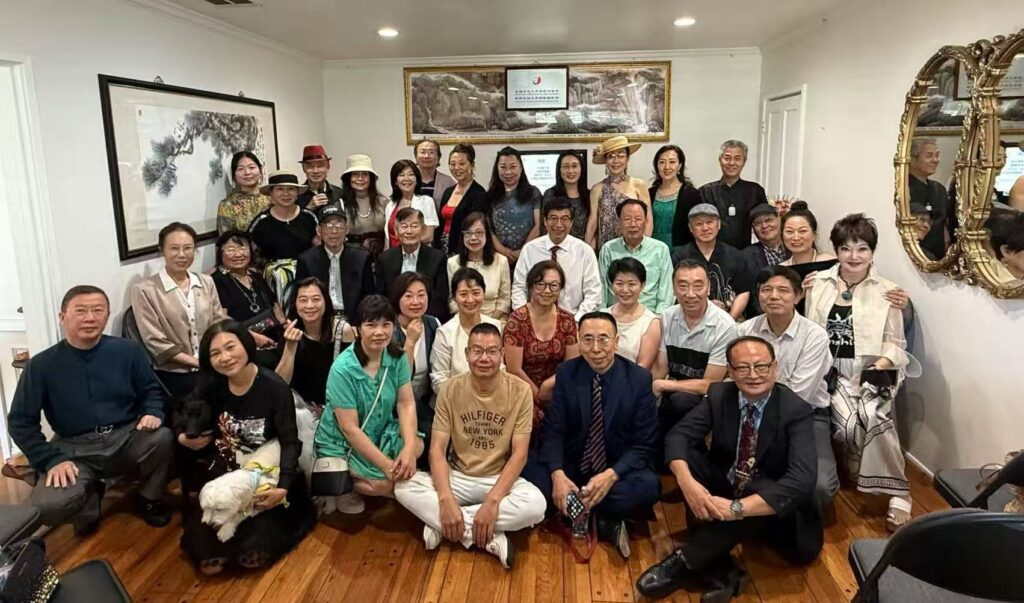
从波罗的海到布拉格 — 刘荣文教授的欧洲世界文化遗产探索之旅 – 刘乃歌(美洲文化资讯)
八月的洛杉矶,阳光透亮,文化的律动悄然在城市一隅展开。8月3日,由美洲文化之声与洛杉矶文学艺术家企业家俱乐部联合主办的“欧洲世界文化遗产探索之旅”专题讲座,吸引了众多文化界人士现场参与。主讲人刘荣文教授以其今年暑期深入芬兰、爱沙尼亚、拉脱维亚、立陶宛、波兰、斯洛伐克、奥地利与捷克等八国的文化考察为基础,娓娓道来一段穿越千年文明、跨越语言与地域的“学术旅行”。
作为一位长期活跃于中美文化交流一线的学者,刘教授不仅是东洛杉矶学院的中国语言文化终身教授,亦担任美西华人学会会长、北美南加州写作协会副会长,其讲述兼具文化视野与人文温度。此次讲座由美洲文化之声总编、世界华文诗歌学会会长韩舸友主持,吸引了近五十位中美文化界人士前来参与,现场交流热烈、思维碰撞不断。
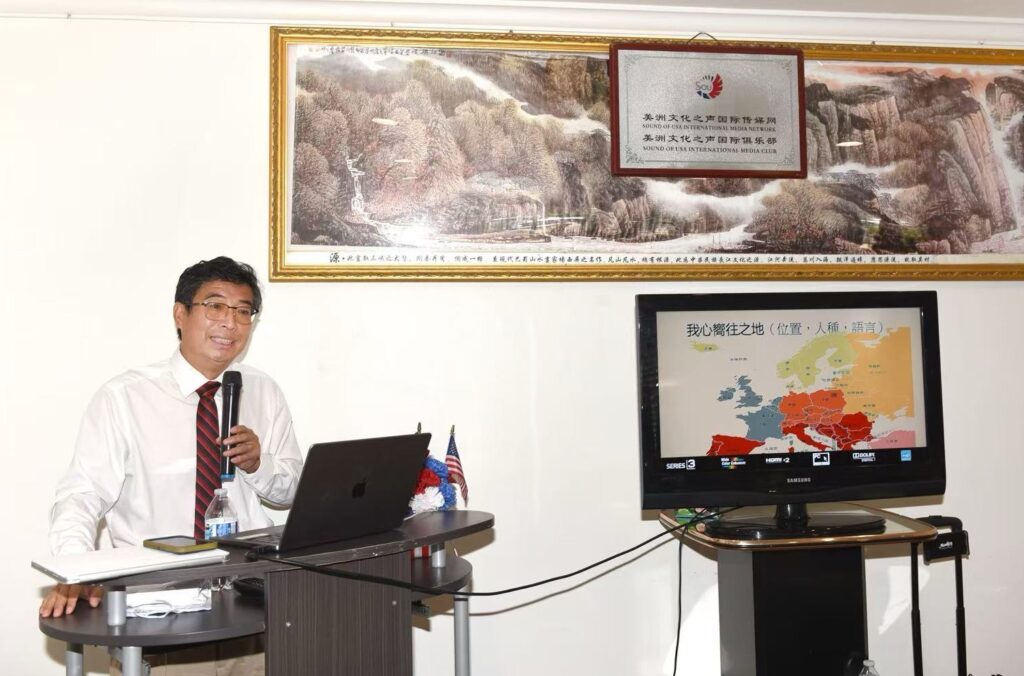
(东洛杉矶学院中国语言文化终身教授刘荣文做主旨发言)
一段文明的深旅:八国踏查,文化为径
“这是一次文明的溯源之旅,也是一次自我对话与跨文化理解的实践。”刘教授一开讲,便以沉稳的语调引出这场历时月余、跨越东欧中部的文化探索。他从芬兰赫尔辛基的岩石教堂谈起,那座以整块花岗岩开凿而成的现代建筑,静静嵌于城市一隅,象征着北欧宗教对自然与精神的融合。
随后,他循着波罗的海的轨迹,讲述了爱沙尼亚、拉脱维亚与立陶宛三国的历史复兴与文化认同。“这是三个在苏联解体后迅速走向现代化的国家,它们以文化为盾,构建民族记忆。”在拉脱维亚首都里加的老城区,刘教授深切感受到建筑语言背后的历史深层——德国骑士团、沙俄统治、苏联管辖与新欧盟意识形态的交错,使这座城市成为一座“多重历史的空间博物馆”。

(美洲文化之声总编、世界华文诗歌学会会长韩舸友教授主持报告会)
在立陶宛,他参观了维尔纽斯老城与特拉凯水上城堡。“中世纪骑士与天主教堂并置于湖水之上,像是宗教、权力与艺术的交汇图谱。”刘教授以细致的文字描绘那里的光影、砖墙与钟声,重现特拉凯湖畔中世纪文明的肃穆与宁静。
在波兰,他先后造访了克拉科夫老城、雅盖隆大学、奥斯维辛集中营遗址与瓦维尔皇家城堡。这些地点像一条深埋在历史褶皱中的文化脉络,引他走进波兰曾经的辉煌与伤痛。他感慨道:“这里的街道与钟声仿佛将人带入哥白尼与肖邦的世界,也是一座建在历史断层带上的城市。”
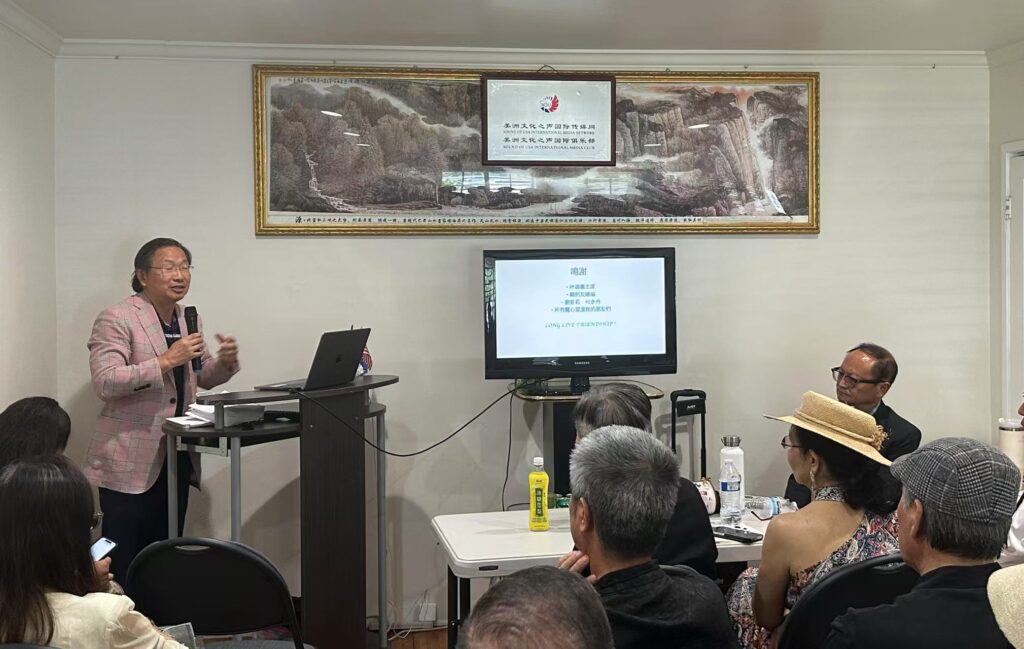
(著名书法家、北美书画院院长孙晓华发言)
随后,他来到华沙,走访华沙大学与哥白尼雕像,并特别瞻仰了居里夫人故居。“那是一间并不起眼的小屋,却孕育了人类历史上第一位获得诺贝尔奖的女性科学家。”刘教授说,正是在这样的空间中,他感受到波兰文化中理性与坚韧并存的精神血脉。他动情讲述波兰如何在战火与分裂中守住自己的文化母体:“文化是一个民族的根基,在最危难时刻,它不但没有倒下,反而成为重建的第一块砖。”
布拉格的黄昏与维也纳的光芒:文明对话的空间交错
旅程最后抵达中欧两大文化重镇——捷克的布拉格与奥地利的维也纳。布拉格的查理大桥、天文钟与卡夫卡故居,让刘教授忆起中世纪欧洲知识分子的孤独与挣扎。“卡夫卡与鲁迅,同属二十世纪初的精神抵抗者,他们虽远隔万里,却在思想的伤口处相遇。”讲座中,他特别提及布拉格的“文化重负”——一个被游客占领的城市,如何在符号化消费中寻找自身灵魂。
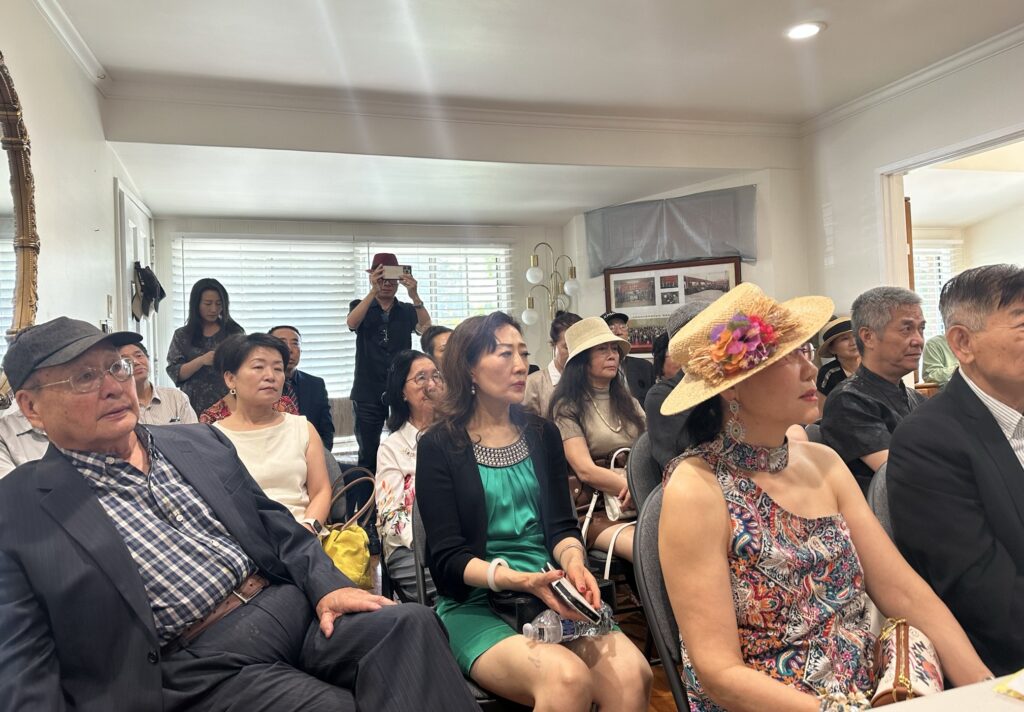
(与会嘉宾正在认真聆听报告会)
维也纳则是古典与现代的完美结合。刘教授参访了金色大厅、国家歌剧院、音乐之友协会,在讲座中播放了他现场录制的部分音乐片段。“文化遗产不只在砖石之间,更在时间的流动中。”他说,一场莫扎特音乐会或一杯传统咖啡馆中的Melange,都映照着哈布斯堡帝国遗产与奥地利现代国家意识的交织。
学者的脚步与文化传播的温度
刘教授在分享中不断强调“亲历”与“在场”的重要性。他并非以游客的姿态走马观花,而是以文化人的敏感和学者的视角,寻找历史中的裂缝与连接。他引用爱沙尼亚艺术家的一句话:“文化是我们与过去和解的桥梁。”
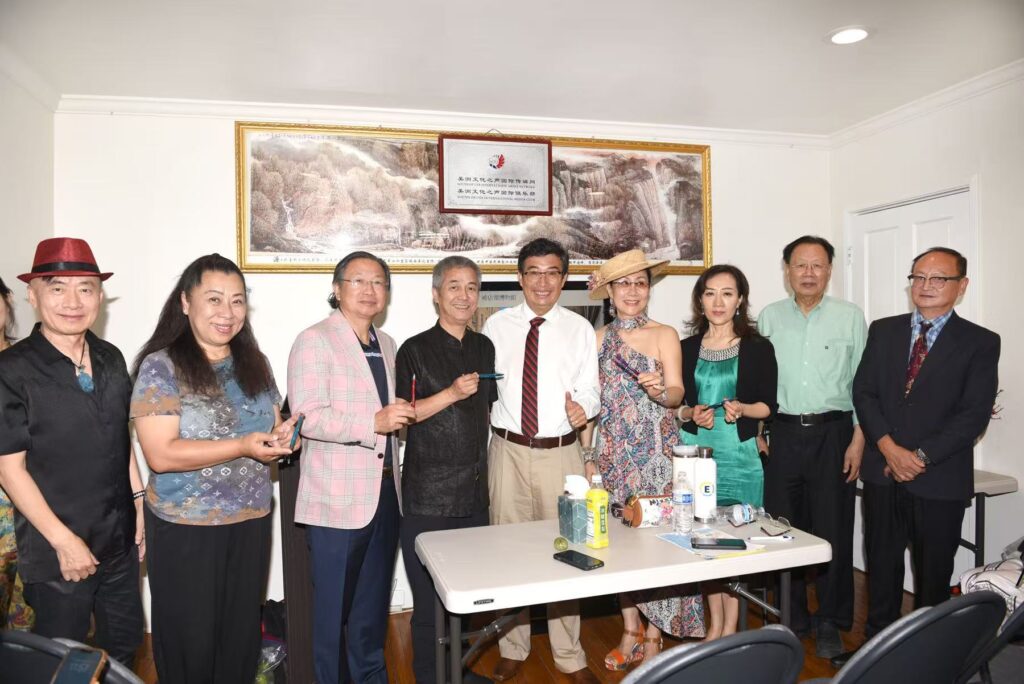
(参加活动部分代表)
从中世纪骑士的光影,到冷战阴影下的记忆重构,再到当代欧盟语境下的文化复兴,刘教授的行走,是一种“用双脚丈量世界遗产”的行动主义。他深知,文化的传播不仅仅是讲述故事,更是理解他者、建立共情的过程。
正如他在讲座结尾所说:“文明的对话不能只是对远方的凝视,而应是一次次低头注视脚下土地的真实行走。”这种行走,对于身在海外的华人文化传播者而言,不仅是学术使命,更是一种文化担当。
多元嘉宾共话“文化的未来”
讲座后的互动环节同样精彩纷呈。美洲文化之声总编韩舸友在总结时指出:“刘教授用他的行走打通了古典文明与当代文化传播之间的桥梁,也提醒我们:作为华文写作者与文化推动者,我们需要更主动地走出去,听世界的声音。”
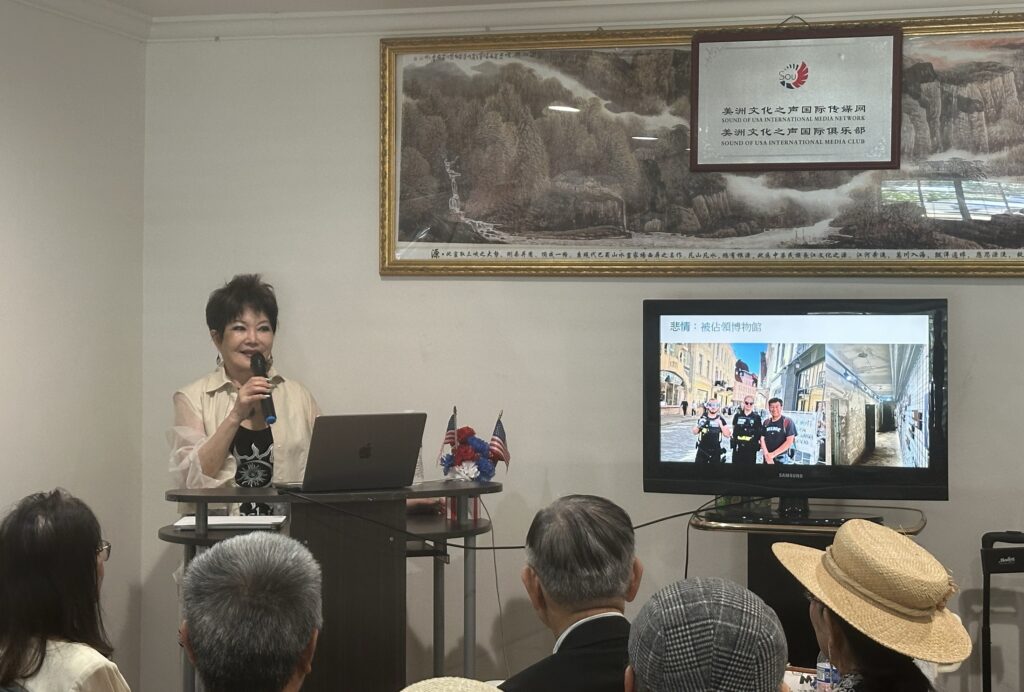
(著名社会活动家刘安莉发言)
张健博士从历史与哲学的高度出发,对本次“文明之旅”予以深刻回应。他指出,东欧文化遗产的回望不仅是一次跨文明的探寻,更是对人类精神本质的再思考,我们需要提升自身的文明自觉与包容精神,在多元并存中共建更有高度的未来。
洛杉矶作家蓬丹评价道:“刘教授的分享文字细腻、观察敏锐,像一位历史地理学者,也像一位旅行诗人。”鲁俐池则表示:“这不仅是文化地理的探索,更是一种个人精神的体认与文化身份的书写。”
其余嘉宾如彭南林、丁丽华、Emily、丁凌、Shirley Xue、王晓明等也纷纷表达了对刘教授讲座的敬意与共鸣,许多听众更表示希望未来能够将讲稿编辑成册,以便更广泛传播。
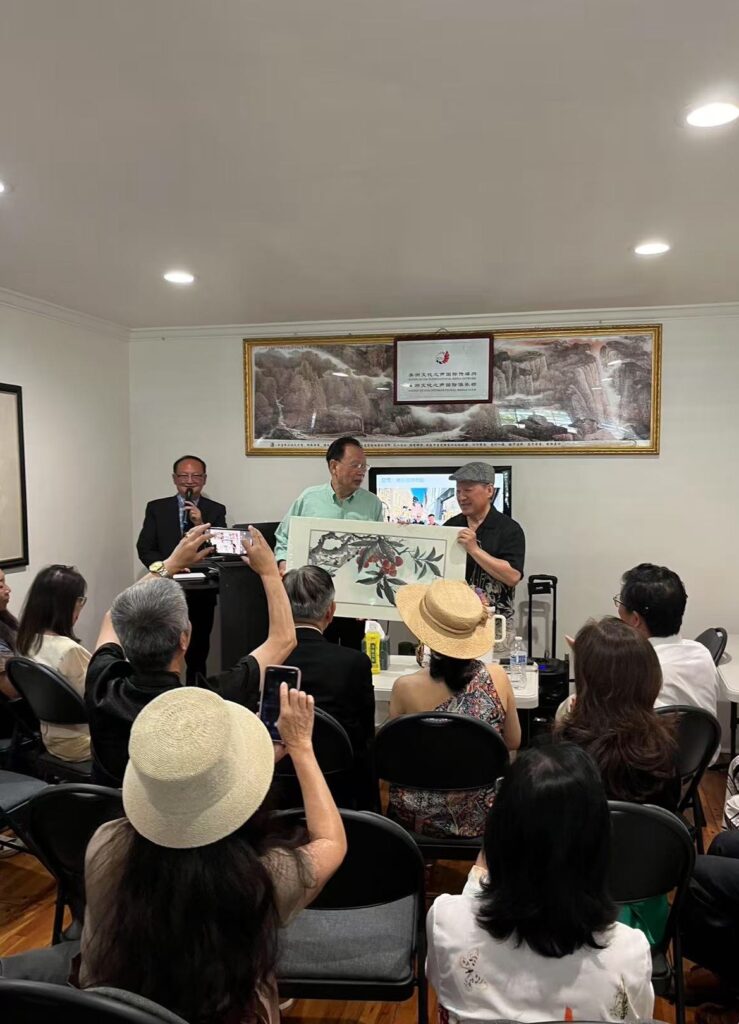
(著名画家何念丹以荔枝图赠予林德宪主席,寓意吉祥丰盈)
美洲文化之声:在跨界中架桥,在交流中生根
作为主办方之一的美洲文化之声,长期致力于推动北美华人文化事业,连接文学、学术、艺术与公共传播的多重维度。此次讲座不仅展示了华人学者在国际文化对话中的主动与自信,也为如何以中文声音参与全球叙事提供了生动范例。
从波罗的海到布拉格,一位华人学者的文化寻踪之旅,不只是个人的知识与经验累积,更是一个群体的文化记忆与世界互动的投射。在全球化与身份焦虑交织的今天,这种“带着灵魂旅行”的方式,也许正是我们理解世界、连接自我最温柔而有力的路径。
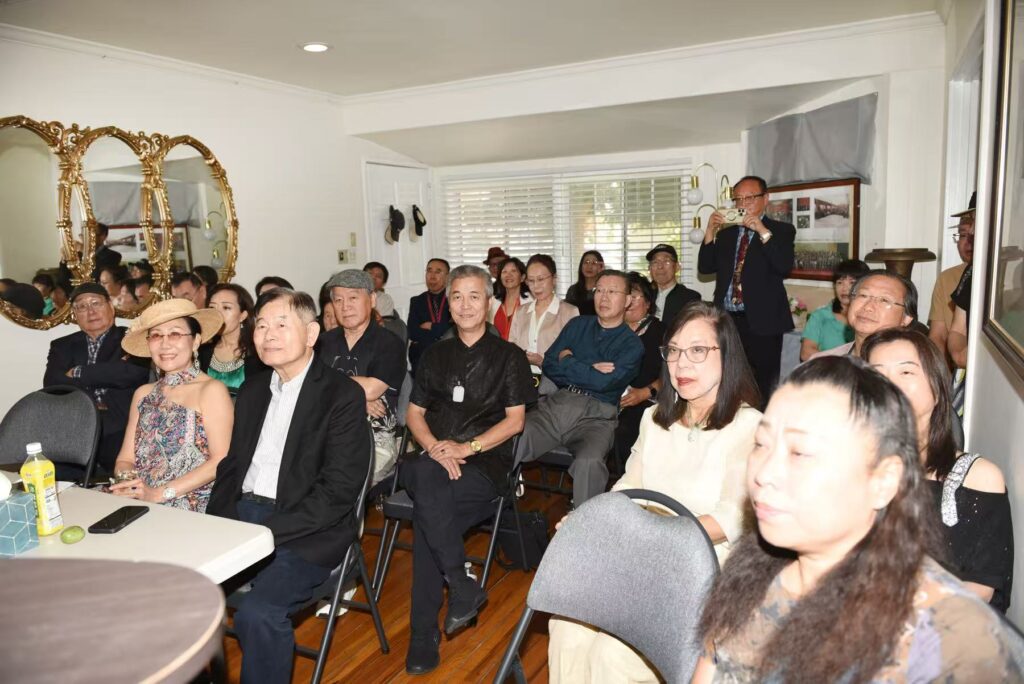
(会场一角)
报告后结束后,来自台湾的著名作家梁柳英老师特别赋诗一首庆贺
夏日雅聚慶會誌趣
烈日呈空熱氣催,
文人雅士再旋迴。
中華國學源流遠,
四海騷人共作陪。
旅行歐洲遊勝地,
傾談分享𣈱懷开。
見聞智識能增廣,
聚會完成慶賀哉。(梁柳英 題於美國南加州。8/3/2025)

(北美作家协会总会长蓬丹发言)
附录:到场嘉宾介绍
美洲文化之声顾问:美华联荣誉主席、洛杉矶温州元老院主席林德宪;美洲文化之声顾问北美作家协会总会长蓬丹;美洲文化之声总编、世界华文诗歌学会会长韩舸友;美洲文化之声副总编辑刘乃歌;美洲文化之声AI创作艺术总监张琼博士;艺术天地栏目主编计紫晨;艺文天下主办人,洛杉矶著名社会活动家刘安莉;北美作家协会副会长,著名双语主持人,好莱坞演员:彭南林;湖北同乡会前会长:丁丽华;著名画家:何念丹;北美书画院国际院长著名书法家孙晓华;艺术家张良羽;作家居小玉;世界阳光女人联合总会主席:鲁俐池;医学博士,曾经担任深圳大学附属医院执行副院长张健;南加州写作协会前会长,著名作家廖茂俊;医学博士、诗人丁凌;北美洛杉矶作家协会副会长王智;著名律师申春平;著名摄影家韩国民;温州同乡会执行会长吴积慧;温州同乡会秘书长多多;地产项目投资管理、保险业务经纪人lily li;政大校友会前会长Michael Wu;文友Shirley Xue;教师Emily Soong;教授張秋;画家金书铭;医疗顾问张漓;作家王晓明;岩土专家颜利平博士;作家梁柳英;文友Emily。

⸻
From the Baltic to Prague: A Chinese Scholar’s Cultural Journey
By Liu Naige (USA)
A Report on the Lecture “Exploring Europe’s World Cultural Heritage”
In August, under the clear, bright skies of Los Angeles, a quiet rhythm of culture unfolded in a corner of the city. On August 3, the lecture titled “Exploring Europe’s World Cultural Heritage,” co-hosted by Voice of American Culture and the Los Angeles Literary, Artistic and Entrepreneurial Club, attracted numerous figures from the cultural community. Professor Liu Rongwen, the keynote speaker, shared insights from his recent cultural journey through eight European countries—Finland, Estonia, Latvia, Lithuania, Poland, Slovakia, Austria, and the Czech Republic—offering a compelling academic voyage across centuries of civilization, transcending languages and borders.
As a long-standing scholar active in Sino-American cultural exchange, Professor Liu is a tenured professor of Chinese Language and Culture at East Los Angeles College. He also serves as the president of the Chinese Scholars Association of the Western United States and vice president of the Southern California Chinese Writers Association. His lecture combined broad cultural vision with deep humanistic warmth. Hosted by Han Keyou, Editor-in-Chief of Voice of American Culture and President of the World Chinese Poetry Society, the event drew nearly 50 scholars, writers, and cultural enthusiasts, sparking lively discussions and intellectual engagement.
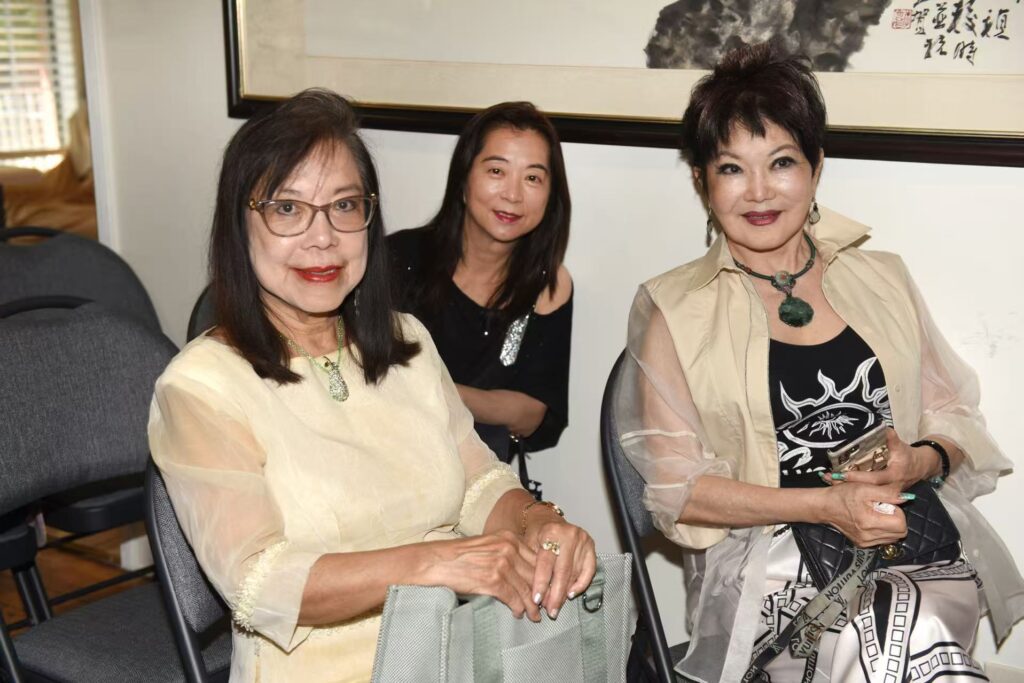
⸻
A Journey into Civilization: Cultural Fieldwork in Eight Nations
“This was a journey tracing the roots of civilization, as well as an exercise in self-reflection and cross-cultural understanding,” Professor Liu began, introducing his month-long cultural exploration across Central and Eastern Europe.
Starting with the Rock Church in Helsinki, Finland—a modern structure carved directly into granite—he described how it symbolizes the Nordic blend of nature and spirituality.
Following the path of the Baltic Sea, he recounted the cultural revival and national identities of Estonia, Latvia, and Lithuania. “These are countries that rapidly modernized after the collapse of the Soviet Union, using culture as a shield to construct collective memory.” In Riga, Latvia’s capital, Professor Liu was deeply moved by the layered history embedded in its Old Town. Germanic knights, Tsarist Russia, Soviet governance, and contemporary EU ideals all intersect in what he described as “a spatial museum of multiple histories.”
In Lithuania, he explored the Old Town of Vilnius and the Trakai Island Castle. “Medieval knights and Catholic cathedrals coexist on lakeside fortresses, forming a tableau where religion, power, and art intersect.” His vivid descriptions captured the light, brickwork, and bell tolls, recreating the solemnity and serenity of medieval civilization by the Trakai Lake.
In Poland, he visited Kraków’s Old Town, the Jagiellonian University, the Auschwitz Memorial, and the Wawel Royal Castle. “These places form a deeply buried cultural artery through the folds of history, leading me into Poland’s past glory and sorrow,” he noted. “The streets and bells seem to echo with the spirits of Copernicus and Chopin—a city built upon historical fault lines.”
In Warsaw, he visited the University of Warsaw, the statue of Copernicus, and the humble house where Marie Curie was born. “It’s an unassuming little home, yet it nurtured the world’s first female Nobel laureate.” There, he felt the Polish spirit—rational and resilient. He reflected emotionally: “Culture is the foundation of a nation. In its darkest times, it didn’t collapse; it became the first brick of rebuilding.”
⸻
Prague’s Twilight and Vienna’s Radiance: Where Civilizations Converse
The journey culminated in Central Europe’s two great cultural capitals: Prague and Vienna.
Prague’s Charles Bridge, Astronomical Clock, and Kafka’s former residence reminded Liu of the solitude and struggle of Europe’s early intellectuals. “Kafka and Lu Xun were both spiritual resisters of the early 20th century. Though oceans apart, their thoughts intersect at the wound of human consciousness.” He emphasized Prague’s “cultural burden”—how a city overwhelmed by tourism seeks to reclaim its soul amid symbolic consumption.
Kafka’s Residence in Prague. Photo by Liu Rongwen.
Vienna, by contrast, is where the classical meets the modern. Visiting the Musikverein (Golden Hall), the National Opera House, and the Society of Friends of Music, Professor Liu played audio clips from live performances. “Cultural heritage doesn’t live only in buildings, but in the flow of time,” he said. “A Mozart concert or a cup of traditional Melange in a Viennese café both reflect the legacy of the Habsburg Empire intertwined with Austria’s modern identity.”

⸻
A Scholar’s Footsteps, the Warmth of Cultural Transmission
Throughout the lecture, Professor Liu repeatedly emphasized the importance of “being present” and “experiencing first-hand.” He did not travel as a tourist, but as a cultural observer and scholar, seeking the fissures and connections of history. He quoted an Estonian artist: “Culture is the bridge through which we reconcile with the past.”
From the shadows of medieval knights, through memories reshaped by the Cold War, to contemporary cultural revitalization within the EU, Liu’s travels represent a kind of “activism through walking.” He understands that storytelling alone is not enough; true cultural communication requires empathy and mutual understanding.
As he concluded: “The dialogue of civilizations should not be a distant gaze toward the ‘other’ but a grounded journey—again and again—beneath one’s own feet.” For overseas Chinese cultural workers, this is more than an academic mission; it is a form of soulful pilgrimage.
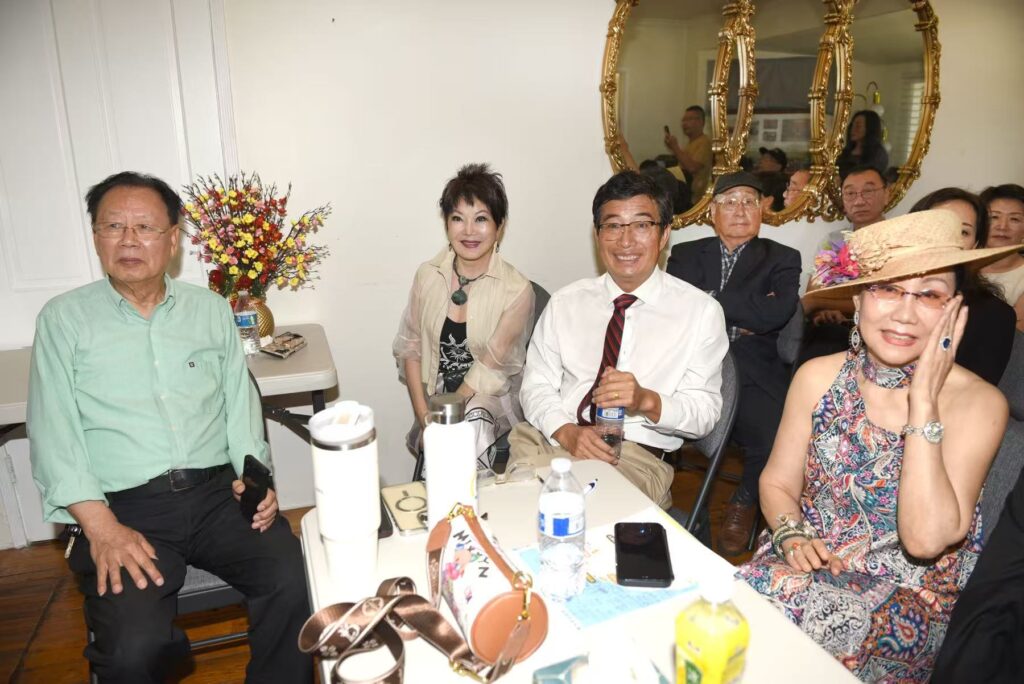
⸻
Cultural Futures: Voices from the Audience
The post-lecture discussion was equally stimulating. Editor-in-Chief Han Keyou noted in his closing remarks: “Professor Liu’s journey bridges classical civilization with contemporary cultural communication, reminding us as Chinese writers and cultural ambassadors to step outside our comfort zones and truly listen to the world.”
Dr. Zhang Jian responded with a philosophical reflection, suggesting that revisiting Eastern European cultural heritage is not only a civilizational inquiry but also a reevaluation of the human spirit. “We must develop greater cultural self-awareness and embrace diversity to build a future of shared human dignity.”
Writer Peng Dan praised Professor Liu’s lyrical language and keen observation: “He is part historian, part geographer, and part poetic traveler.” Lu Lichi added: “This was more than a geographic or cultural survey—it was a personal spiritual journey and a writing of cultural identity.”
Other guests, including Peng Nanlin, Ding Lihua, Emily, Ding Ling, Shirley Xue, and Wang Xiaoming also shared heartfelt responses. Many expressed hopes that the lecture content could be compiled into a published collection for broader dissemination.
⸻
Voice of American Culture: Building Bridges Across Borders
As a key organizer, Voice of American Culture continues its commitment to advancing Chinese cultural endeavors in North America, integrating literature, scholarship, art, and public communication. This lecture not only showcased the proactive role of Chinese scholars in global cultural dialogue, but also served as a vivid example of how Chinese-language voices can participate meaningfully in global narratives.
From the Baltic to Prague, a Chinese scholar’s cultural exploration is more than a personal academic journey—it is a projection of collective memory and engagement with the world. In an era of globalization and identity anxiety, perhaps this kind of “soulful travel” is the gentlest yet most powerful way for us to understand the world—and to connect with ourselves.
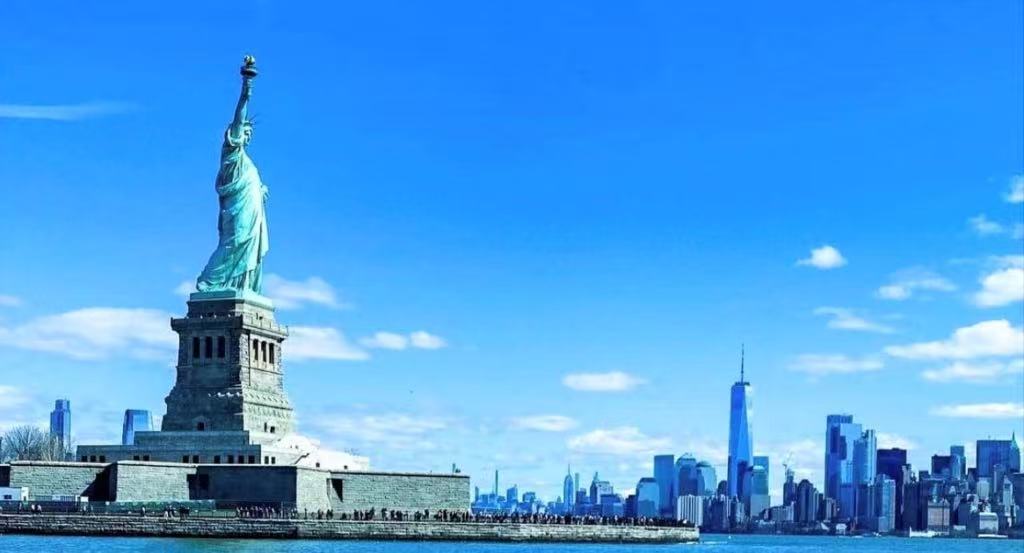
《美洲文化之声》简介:
《美洲文化之声》国际传媒网(Sound of USA)成立于2016年,是美国注册的综合网络平台,主要从事华语文学作品的交流推广。目前已与Google、百度、Youku、Youtube 等搜索引擎联网,凡在这里发表的作品均可同时在以上网站搜索阅读。
我们致力于弘扬中华传统文化,同时提倡文学创作的思想性和唯美主义风格,为世界各地的华语文学作品交流尽一份微博之力。同时,美洲文化之声俱乐部团结了众多的海内外知名诗人、作家和评论家,正在形成华语世界高端文学沙龙。不分国籍和地区、不分流派,相互交流学习,共同为华语文学的发展效力。
“传播中华优秀文化、倾听世界美好声音,”是我们美好的追求和不可推卸的责任。

总顾问:森道.哈达(蒙古国)
顾问:蓬丹(美国)、李发模(中国)、祁人(中国)谭五昌(中国)、张素久(美国)、林德宪(美国)、萨仁图雅(中国)、周占林(中国)北塔(中国)
总编辑:韩舸友(美国)
副总编:冷观(美国)、
副总编:jinwenhan(加拿大)
副总编:曹谁(中国)
副总编:刘乃歌(中国)
AI创作艺术总监:张琼(美国)
国际交流中心总监:王芳闻(中国)
中国交流中心总监:夏花(中国)
欧洲交流中心总监:Angel.XJ (英国)
——————————————————
编辑发帖时间: 世界诗歌欣赏, 书画摄影, 作家论坛, 国际文化资讯, 夏威夷国际文联之窗, 小说, 散文, 朗读者, 现代诗, 联系我们, 艺术天地, 译林漫步, 诗词
← 沁园春·赴迪拜诗歌艺术节 / 赵西斌诗词作品欣赏(中国)
发表回复
以 Sound of USA 的身份登录。 编辑您的个人资料。 注销? 必填项已用 * 标注
评论 *
